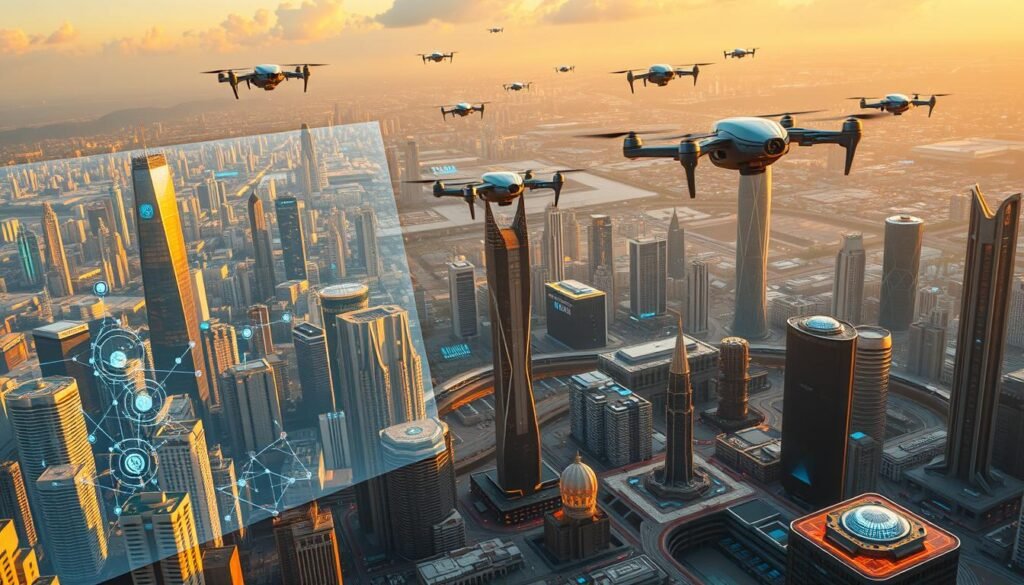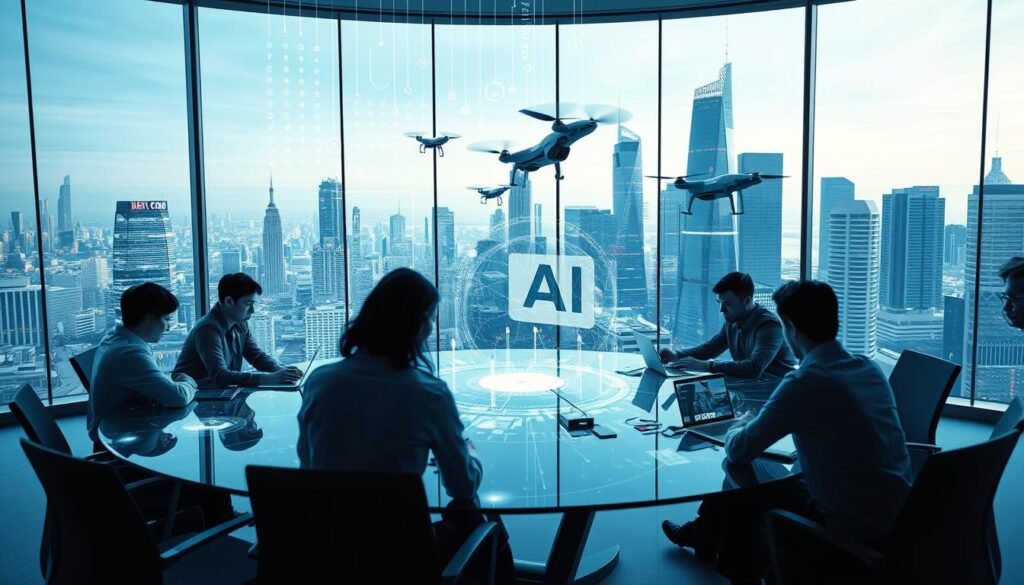Are you curious about the rapid advancements in artificial intelligence that are transforming industries worldwide?
The world of AI is evolving at an unprecedented pace, with innovations like Palladyne AI and Tempus AI leading the charge. As machine learning continues to advance, its applications are becoming increasingly diverse, from healthcare to finance.
Staying abreast of these developments is crucial for professionals and enthusiasts alike. Our AI News Roundup aims to provide a comprehensive overview of the latest ai news and trends, keeping you informed about the future of technology.
Key Takeaways
- Overview of current AI trends and advancements
- Insights into the impact of AI on various industries
- Updates on pioneering AI technologies like Palladyne AI and Tempus AI
- Analysis of the growing importance of machine learning
- Guidance on staying updated with the latest ai news
The Current State of AI: A 2025 Overview
AI technology is advancing at an incredible pace in 2025, reshaping the future. The tech industry is witnessing significant innovations, with AI playing a crucial role in driving these changes.

Key AI Statistics and Growth Metrics
The AI market is experiencing rapid growth, with significant investments being made in AI research and development. Some key statistics include:
- The global AI market is projected to reach $190 billion by 2025.
- AI adoption is expected to increase by 40% annually.
- NLP breakthroughs are driving advancements in AI applications.
These statistics highlight the growing importance of AI in the tech industry, driving innovation and transforming business operations.
Major Players Shaping the AI Landscape
Several major players are shaping the AI landscape, including NVIDIA, Google, and Microsoft. These companies are at the forefront of AI research insights and are driving technological advancements.
NVIDIA, for instance, is leading the way in AI hardware with its latest GPU architectures, while Google is making significant strides in NLP breakthroughs and AI applications.
Their contributions are not only advancing AI technology but also fostering a competitive environment that is pushing the boundaries of what is possible with AI.
Latest ai news: breaking developments this month
As we dive into the latest ai news, it’s clear that the technology is advancing at an unprecedented rate. This month has brought numerous significant announcements and industry-changing implementations that are worth exploring.
This Week’s Most Significant AI Announcements
Recent AI announcements have highlighted the technology’s growing capabilities. For instance, advancements in natural language processing have enabled more sophisticated chatbots and virtual assistants. These developments are not only improving customer service but also enhancing user experience across various platforms.

Industry-Changing AI Implementations
AI is being implemented across various industries, transforming the way businesses operate. From healthcare to finance, AI is driving innovation and efficiency. Companies are leveraging AI to improve their operations, reduce costs, and gain a competitive edge.
| Announcement | Description | Potential Impact |
|---|---|---|
| Advancements in NLP | Improved language understanding and generation capabilities | Enhanced customer service through more sophisticated chatbots |
| AI in Healthcare | Application of AI for diagnostic purposes and personalized medicine | Improved patient outcomes through early diagnosis and tailored treatment plans |
| AI-driven Financial Analysis | Use of AI for predictive analytics and risk assessment | Better investment decisions and risk management |
The latest ai news is a testament to the technology’s potential to revolutionize various aspects of our lives and industries. As AI continues to evolve, we can expect even more groundbreaking developments in the months to come.
Generative AI Revolution: ChatGPT and Beyond
The rise of generative AI, led by models such as ChatGPT, marks a significant shift in AI development. This revolution is characterized by cutting-edge AI developments that are transforming industries and redefining the boundaries of machine learning.
OpenAI’s Recent Updates and Capabilities
OpenAI has been at the forefront of this revolution, with recent updates to ChatGPT showcasing significant advancements in natural language processing and generation. These updates have enabled ChatGPT to engage in more coherent and contextually relevant conversations, making it a valuable tool for various applications. The latest version has also seen improvements in handling nuanced queries and generating human-like responses.

Competing Models and Their Unique Features
While OpenAI’s ChatGPT has garnered significant attention, other models have emerged as strong competitors. Models like Google’s Bard and Meta’s LLaMA are making strides in the generative AI space, each with unique features. For instance, Google’s Bard is known for its integration with other Google services, enhancing its utility for users already within the Google ecosystem. Meanwhile, Meta’s LLaMA is recognized for its efficiency and performance on less powerful hardware, making it accessible to a broader range of developers.
Real-World Applications Transforming Industries
The impact of generative AI is being felt across various sectors. In customer service, AI chatbots are improving response times and personalization. In content creation, AI tools are assisting in generating high-quality content, from articles to videos. Moreover, in software development, AI is being used to automate coding tasks, significantly speeding up the development process. These AI technology advancements are not only enhancing productivity but also opening up new possibilities for innovation.
As machine learning news continues to highlight the progress in generative AI, it’s clear that this technology is set to revolutionize numerous aspects of our lives and industries. The ongoing development and refinement of these models will be crucial in shaping the future of AI.
Machine Learning Advancements Reshaping Technology
Recent advancements in machine learning are transforming technological capabilities, driving innovation across various industries. The field is witnessing significant breakthroughs that are reshaping how we interact with technology.
Breakthrough Algorithms and Methodologies
New algorithms and methodologies are being developed to improve the efficiency and accuracy of machine learning models. Some of the key advancements include:
- Deep Learning: Techniques like convolutional neural networks (CNNs) and recurrent neural networks (RNNs) are enhancing image and speech recognition.
- Reinforcement Learning: This approach is enabling machines to learn from their environment and make decisions autonomously.
Performance Improvements in ML Systems
Performance improvements are crucial for the widespread adoption of ML technologies. Recent advancements have focused on:
- Hardware Acceleration: Specialized hardware like GPUs and TPUs are significantly boosting ML processing speeds.
- Optimized Software: Improvements in software frameworks are making ML models more efficient and scalable.
Democratization of ML Tools
The democratization of ML tools is making these technologies accessible to a broader audience. This includes:
- Cloud-based Services: Cloud platforms are providing easy access to ML tools and infrastructure.
- Open-source Frameworks: Open-source libraries are enabling developers to build and deploy ML models without significant upfront costs.

These advancements are collectively driving the rapid evolution of machine learning, enabling new applications and transforming industries. As ML continues to advance, we can expect even more innovative solutions to emerge.
NLP Breakthroughs: How AI Is Mastering Human Language
AI’s capacity to understand and interact with human language is being dramatically enhanced by recent NLP breakthroughs. These advancements are not only improving how machines comprehend language but also how they generate human-like responses.
Latest Innovations in Natural Language Processing
Recent years have seen significant innovations in NLP, including the development of more sophisticated language models. These models, such as transformer-based architectures, have greatly improved the ability of AI systems to understand nuanced language structures and context.
Advanced language models are now capable of capturing subtle aspects of human communication, including idioms, colloquialisms, and context-dependent expressions.
Multilingual Capabilities and Translation Advancements
NLP breakthroughs have also led to significant improvements in multilingual capabilities and translation technologies. Modern AI systems can now translate languages with a high degree of accuracy, facilitating global communication.
The development of multilingual models has been particularly impactful, allowing AI to understand and generate text in multiple languages, thus breaking down language barriers.
Conversational AI Improvements
Conversational AI has seen substantial improvements, with systems now able to engage in more natural and productive dialogues. This is largely due to advancements in understanding user intent and context.
Chatbots and virtual assistants are becoming increasingly sophisticated, able to handle complex queries and provide personalized responses.
AI in Healthcare: Life-Saving Innovations
Recent advancements in AI are making significant impacts on healthcare, improving patient outcomes and streamlining clinical workflows. The integration of AI technologies is enhancing the quality and efficiency of healthcare services, from diagnosis to treatment.
Diagnostic Tools and Medical Imaging Breakthroughs
AI is revolutionizing diagnostic tools and medical imaging. Advanced algorithms can now analyze medical images with a high degree of accuracy, helping doctors detect conditions such as cancer at an early stage. For instance, AI-powered computer vision can assist in interpreting X-rays, MRIs, and CT scans, reducing the likelihood of human error.
The use of AI in medical imaging is not only improving diagnostic accuracy but also speeding up the process, enabling healthcare providers to make timely decisions and initiate appropriate treatments.
Drug Discovery and Development Acceleration
AI is also accelerating drug discovery and development. By analyzing vast datasets, AI can identify potential drug candidates and predict their efficacy and safety. This not only reduces the time and cost associated with bringing new drugs to market but also increases the likelihood of discovering effective treatments for complex diseases.
| Application | Benefit |
|---|---|
| Predictive Analytics | Identifies potential drug candidates |
| Data Analysis | Predicts drug efficacy and safety |
Patient Care Optimization Through AI
AI is optimizing patient care by personalizing treatment plans and improving patient engagement. AI-powered chatbots and virtual assistants are being used to provide patients with relevant health information and support, enhancing their overall care experience.
Moreover, AI-driven analytics can help healthcare providers identify high-risk patients and intervene early, reducing the likelihood of hospital readmissions and improving patient outcomes.
AI Hardware Evolution: Chips and Infrastructure
AI hardware is undergoing a significant transformation, driven by the need for more powerful and efficient processors. As AI models become increasingly complex, the demand for specialized hardware that can handle these computations is growing rapidly.
NVIDIA’s Latest AI Processors
NVIDIA has been at the forefront of AI hardware development, continually pushing the boundaries of what’s possible. Their latest AI processors, such as the NVIDIA H100 Tensor Core GPU, offer significant performance improvements over previous generations. These advancements are crucial for training large language models and other AI applications.
Some key features of NVIDIA’s latest AI processors include:
- Increased memory bandwidth for faster data transfer
- Improved tensor processing for enhanced AI performance
- Support for new instruction sets that optimize AI computations
Custom AI Chips from Tech Giants
Major tech companies are developing their own custom AI chips to meet specific needs. For instance, Google’s Tensor Processing Units (TPUs) are designed to accelerate machine learning workloads, while Amazon’s Inferentia chips focus on optimizing inference performance.
The development of custom AI chips is driven by several factors:
- The need for better performance and efficiency in AI applications
- The desire to reduce dependence on third-party hardware vendors
- The opportunity to tailor hardware to specific AI workloads
Quantum Computing and AI Integration
Quantum computing represents a potentially revolutionary step in AI hardware evolution. By leveraging quantum-mechanical phenomena, quantum computers can solve certain problems much faster than classical computers. The integration of quantum computing with AI has the potential to unlock new capabilities and solve complex problems that are currently intractable.
Key areas of focus for quantum-AI integration include:
- Developing quantum algorithms that can be applied to AI problems
- Improving the coherence and error correction capabilities of quantum systems
- Exploring the potential for quantum-AI hybrid systems that combine the strengths of both paradigms
Global AI Developments: International Landscape
As AI continues to reshape industries worldwide, international developments are playing a crucial role in its advancement.
China’s AI Ecosystem and Policies
China has been aggressively advancing its AI capabilities, with significant investments in research and development. The country’s AI ecosystem is characterized by a strong government push, with initiatives aimed at making China a world leader in AI by 2030.
European Union’s AI Approach
The European Union is taking a different approach to AI development, focusing on ethical AI and data protection. The EU has introduced regulations such as the General Data Protection Regulation (GDPR) to ensure that AI is developed and used responsibly.
Emerging Markets and AI Adoption
Emerging markets are also adopting AI technologies, with countries like India and Brazil making significant strides in AI research and implementation. These countries are leveraging AI to drive economic growth and improve public services.
The global AI landscape is diverse, with different regions contributing to its growth and development. Understanding these international developments is crucial for businesses and policymakers looking to harness the potential of AI.
AI Ethics and Regulation: New Frameworks Emerging
As AI continues to permeate various aspects of our lives, the need for robust ethical frameworks and regulatory guidelines has become increasingly paramount. The development and deployment of AI systems raise significant ethical concerns that necessitate a comprehensive approach to regulation.
Government Policies and Regulatory Developments
Governments worldwide are actively working on establishing regulatory frameworks to govern AI development and deployment. For instance, the European Union has introduced the AI Act, a comprehensive legislation aimed at ensuring AI systems are safe and respect human rights.
Key aspects of government policies include:
- Transparency in AI decision-making processes
- Accountability for AI-related incidents
- Ensuring AI systems are free from bias
Industry Self-Regulation Efforts
Alongside government regulations, industry players are also taking steps to self-regulate AI development. This includes adopting ethical AI practices and guidelines to ensure responsible AI deployment.
Notable industry initiatives include:
- Establishing AI ethics boards within organizations
- Developing industry-wide standards for AI development
- Promoting transparency in AI research and development
Ethical Considerations in AI Development
Ethical considerations are crucial in AI development to prevent potential misuse and ensure AI systems benefit society. This involves addressing issues such as privacy, bias, and job displacement.
| Ethical Issue | Description | Potential Solution |
|---|---|---|
| Privacy | AI systems often require vast amounts of personal data, raising privacy concerns. | Implementing robust data protection measures and ensuring transparency in data usage. |
| Bias | AI systems can perpetuate and amplify existing biases if not properly designed. | Developing AI systems that are fair and unbiased through diverse training data and regular audits. |
In conclusion, the emerging frameworks for AI ethics and regulation are crucial for ensuring that AI technologies are developed and deployed responsibly. Both government policies and industry self-regulation efforts play a vital role in shaping the future of AI.
AI in Business: Industry-Specific Transformations
AI advancements are revolutionizing the way businesses operate in various sectors. The integration of AI technology is enabling companies to streamline processes, improve efficiency, and drive innovation.
Financial Services and Fintech
In the financial services sector, AI is being used to detect fraudulent transactions, predict market trends, and provide personalized customer service. Machine learning algorithms are being employed to analyze vast amounts of data, enabling banks and financial institutions to make informed decisions. For instance, JPMorgan Chase is using AI-powered systems to analyze legal documents, reducing the time spent on this task from 360,000 hours to just a few seconds.
Manufacturing and Industry 4.0
The manufacturing industry is undergoing a significant transformation with the adoption of AI and machine learning. Predictive maintenance is being used to minimize downtime and optimize production processes. Companies like Siemens are leveraging AI to improve product quality and reduce costs.
Retail and E-commerce
In retail and e-commerce, AI is being used to enhance customer experience and improve operational efficiency. Personalized recommendations are being made using machine learning algorithms, while chatbots are being employed to provide customer support. Recent developments in AI have enabled retailers to optimize their supply chains and improve inventory management.
Transportation and Logistics
The transportation and logistics industry is also benefiting from AI advancements. Route optimization is being used to reduce fuel consumption and lower emissions. Companies like UPS are using AI-powered systems to improve delivery times and reduce costs. Recent developments in AI are enabling logistics companies to better manage their fleets and improve overall efficiency.
AI Research Insights: Academic and Corporate Breakthroughs
The field of AI is rapidly evolving, with new breakthroughs emerging from both academic and corporate research labs. These advancements are not only pushing the boundaries of what AI can achieve but are also transforming various industries.
Noteworthy Papers and Publications
Recent research papers have highlighted significant advancements in AI. For instance, publications on transformer models have shown remarkable improvements in natural language processing tasks. Notable researchers have also explored new methodologies for explainable AI, making AI systems more transparent and trustworthy.
“The development of more sophisticated AI models requires a deep understanding of both the technical and ethical implications of these technologies.” – Dr. Jane Smith, AI Researcher
University and Research Lab Contributions
Universities and research labs are at the forefront of AI innovation. Institutions like MIT and Stanford are conducting pioneering research in areas such as computer vision and robotics. Their work is not only advancing the field but also producing the next generation of AI talent.
Corporate Research Initiatives
Corporate research labs, such as those at Google and Microsoft, are also making significant contributions to AI research. These labs are focused on developing practical applications of AI that can be integrated into real-world products and services. Their efforts are driving the adoption of AI across various sectors.
As AI continues to evolve, the collaboration between academic and corporate research will be crucial in shaping the future of the field. By combining theoretical advancements with practical applications, we can unlock the full potential of AI.
AI Startups to Watch: Funding and Innovation Highlights
As AI continues to transform industries, startups are at the forefront of innovation, driving significant advancements. The current landscape is characterized by exciting developments in funding, emerging players, and trends that are shaping the future of AI.
Recent Funding Rounds and Acquisitions
The AI startup ecosystem has seen a surge in funding, with several companies securing substantial investments. For instance, Scale AI raised $100 million in a Series F funding round, valuing the company at $7.3 billion. Such investments highlight the growing interest in AI technologies and their potential to revolutionize various sectors.
Recent acquisitions have also made headlines, with NVIDIA’s acquisition of DeepMap being a notable example. This acquisition underscores the importance of AI in the automotive and mapping industries.
| Startup | Funding Round | Amount |
|---|---|---|
| Scale AI | Series F | $100M |
| Crunchbase | Series D | $50M |
| Element AI | Series B | $200M |
Emerging Players Disrupting Traditional Markets
Startups like Runway are making significant strides in AI research and application, particularly in creative industries. Their innovative use of AI for content creation is disrupting traditional markets and opening new avenues for artists and creators.
Another emerging player, PathAI, is leveraging AI to improve pathology diagnostics, demonstrating the potential of AI to transform healthcare.
Startup Trends and Focus Areas
Current trends indicate a strong focus on explainable AI, edge AI, and AI for social good. Startups are developing solutions that not only push the technological boundaries but also address societal challenges.
The emphasis on ethical AI and responsible AI development is also becoming more pronounced, with companies prioritizing transparency and fairness in their AI systems.
Conclusion: Navigating the Rapidly Evolving AI Landscape
The artificial intelligence landscape is transforming at an unprecedented rate, driven by machine learning advancements and innovative applications. As highlighted in this article, the latest AI news underscores the significant strides being made across various sectors, from healthcare to finance.
Staying abreast of artificial intelligence updates is crucial for understanding the future trajectory of this technology. The convergence of AI with other emerging technologies is poised to revolutionize industries and create new opportunities. As we move forward, it is essential to remain informed about the latest ai news and developments shaping the AI ecosystem.
By doing so, we can better navigate the complexities of this rapidly evolving landscape and harness the potential of AI to drive growth, improve efficiency, and enhance decision-making.



